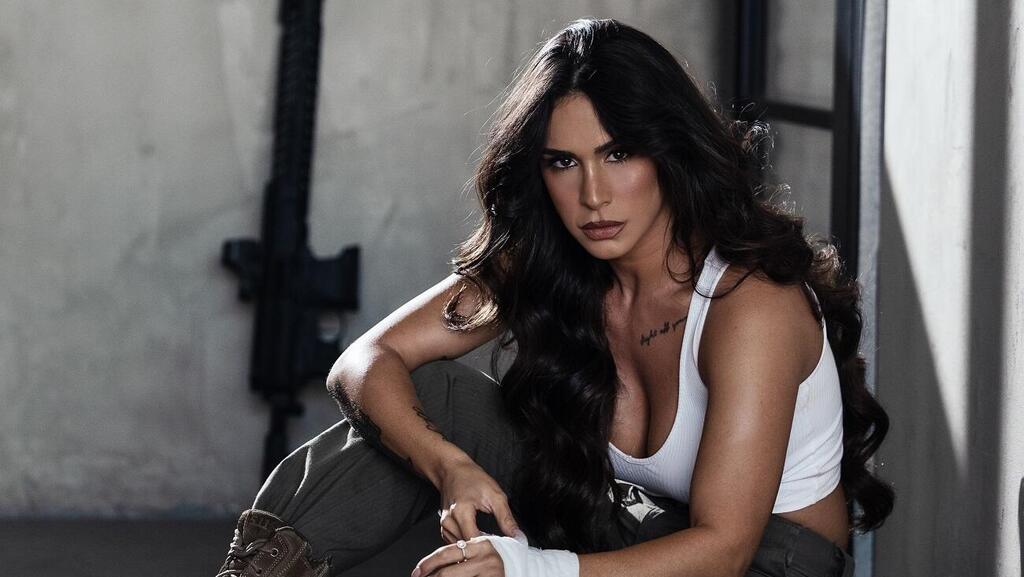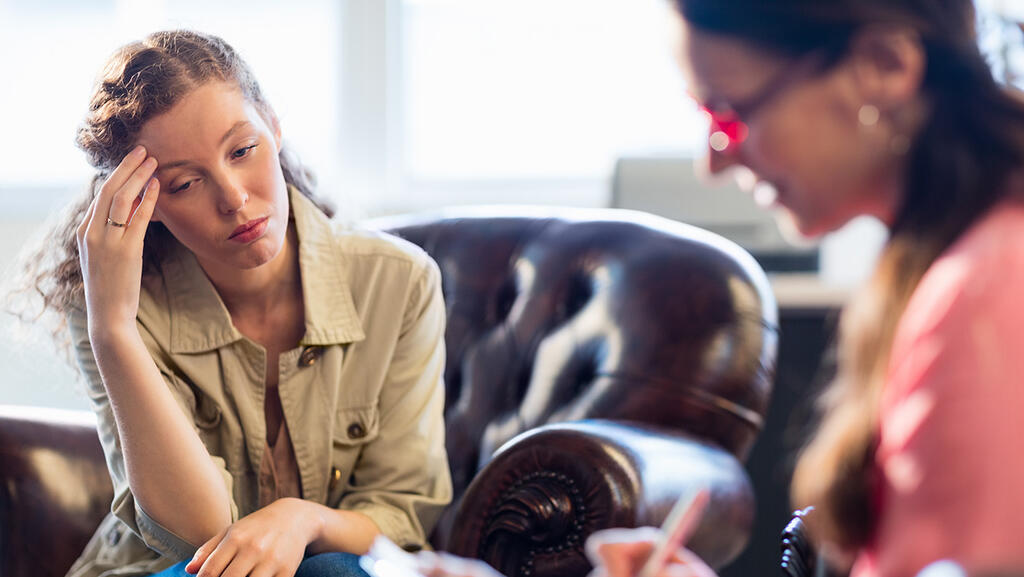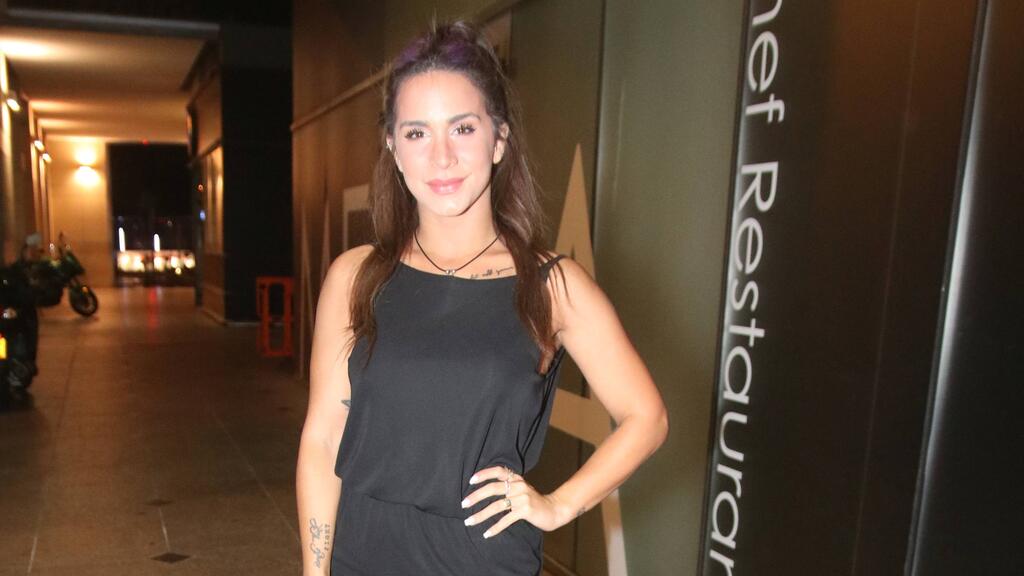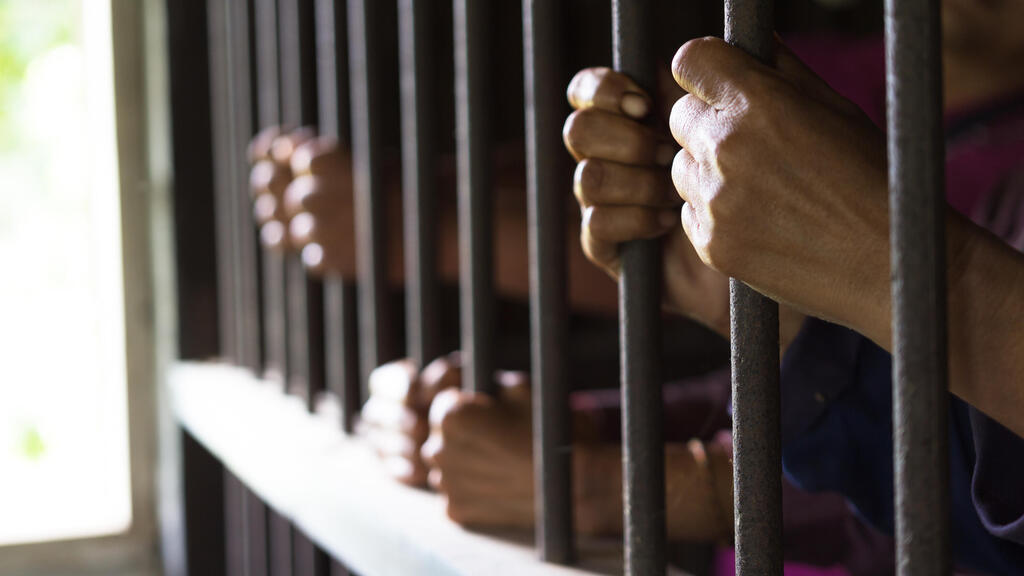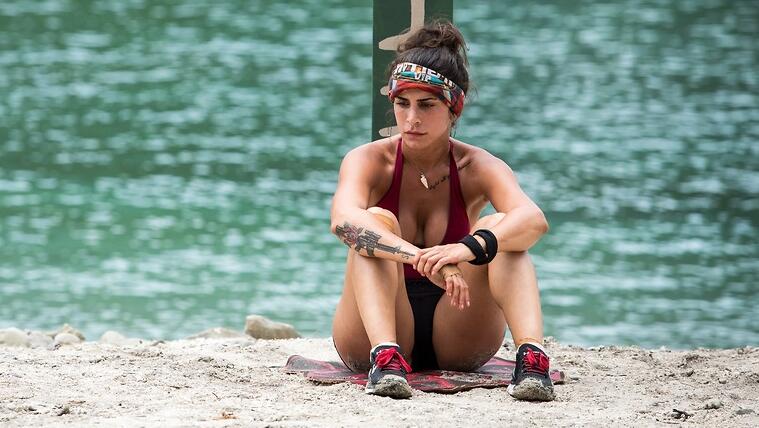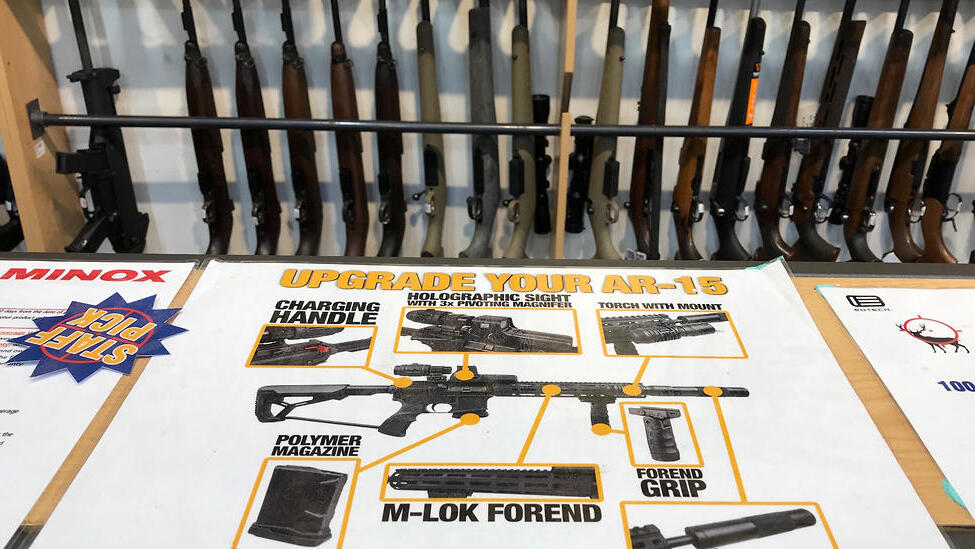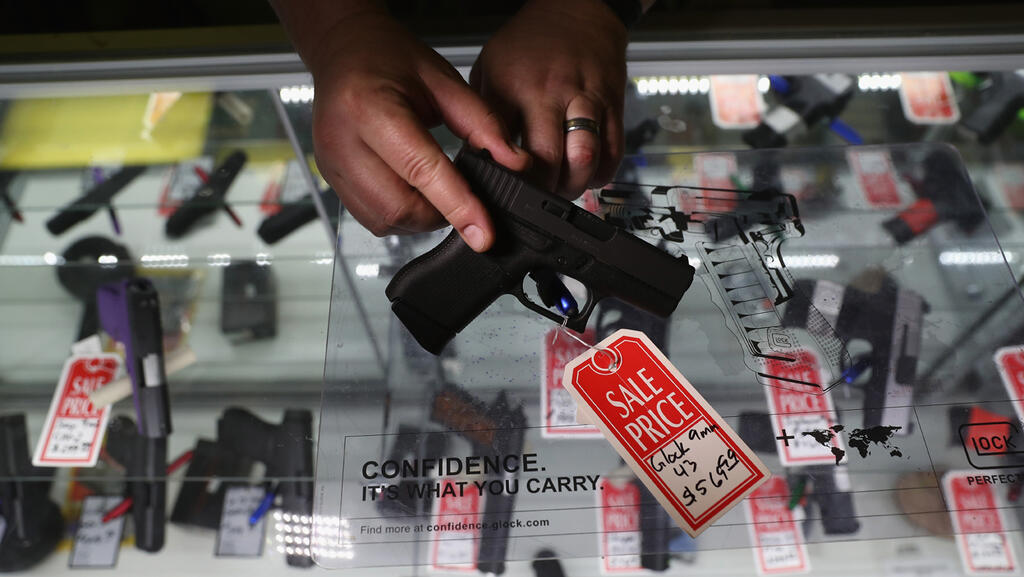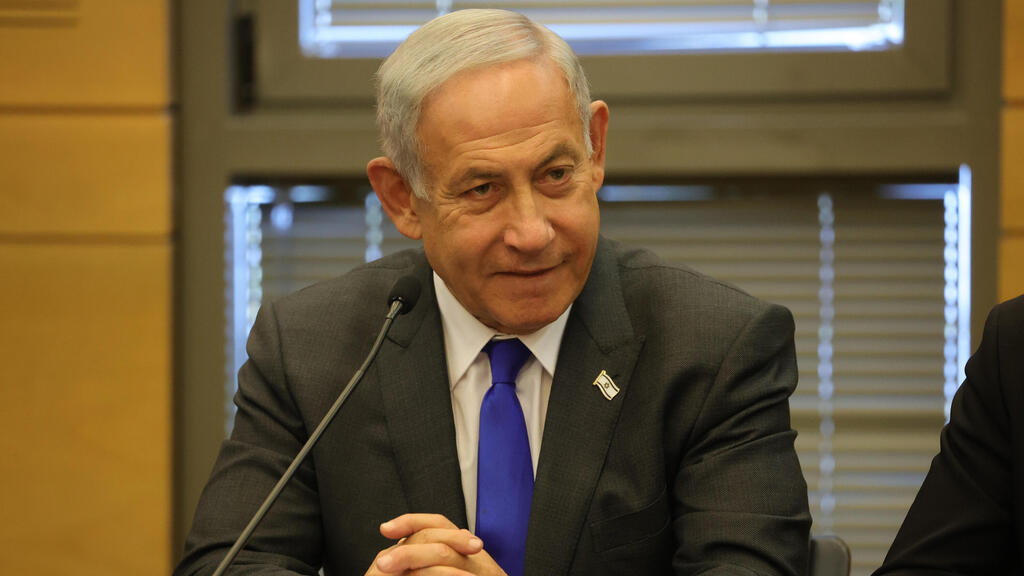The turning point was three years ago, during the finale of “Hisardut” the Israeli version of the reality show “Survivor.” One contestant, Orin Julie, who by then was already known as Israel’s “Queen of Guns,” was eagerly awaiting her turn in the dressing room.
Production people were running around her. “Gili Algebi was doing my hair and make-up. There were cameras everywhere. I could hear the crowd screaming outside – just as I’d always dreamt it would be. I’d been waiting for this moment. But I was there, sitting on a chair, wanting to die. I didn’t understand why I was like this. The fame hadn’t help me heal. What could really help me?”
At the time, she was obsessively plucking out hairs. Julie tells us: “I Googled it and found out that I was suffering from a disorder brought on by emotional distress. The disorder’s called ‘trichotillomania.’ It’s a compulsive desire to carry out the same action repeatedly - biting one’s nails or inner lip, pulling out hair.
"It’s rooted in something that has been emotionally repressed. I read that it had to be treated quickly. I saw five therapists, none of whom were of any real help. The last therapist suggested that I had been sexually abused as a child. I didn’t understand what he wanted out of me.“
But, she did have memories: “I thought all girls experienced what I had. I thought it was natural. When I was eight, my father explained that what he did to me at nighttime was okay. The psychologist said that it was still affecting me. I was shocked. I carried on my sessions with him, but it didn’t really help me overcome the violence and aggression I was harboring.
"I Googled ‘sexual abuse of young girls,’ and started reading up. One issue that kept recurring was that you shouldn’t keep it bottled up. You have to talk. You have to share. Until then, I’d told almost no one. I then started talking about it, but I wasn’t yet ready to reveal the biggest secret of all – that it was my father.
"Once I started talking about the abuse, I found a psychotherapist who turned out to be a real angel. My life changed the day I met her. She walked me down the aisle with my mother. I learnt that our lives are made up of our childhood glories and catastrophes.“
At first glance, it all looked great. Her family – mother, father and two elder brothers lived in a large, comfortable home in Rishon LeZion.
“I loved my father. During the day, he’d spoil me. He’d pick me up from school. We’d hang out and go places together. He’d buy me whatever I wanted. But at night, he'd turn into the devil. I remember it in pieces – from the time I was eight, through to when I was 17. He died of cancer two years later.“
At what stage did you realize that what was going on at home wasn’t okay?
“In fifth grade, I was taken to the hospital because of what my father was doing. A social worker told me: ‘Darling, who’s touching you? Who’s doing bad things to you?’ I told her that I did it to myself. She said that wasn’t possible and that someone else had to have touched me for that to happen.
"So, there I was, just after being prepped by my father, who said that if I said a word, he’d go to jail and the family would fall apart because of me. I was my parents’ hero and I protected them. I was sure I was saving them. Inside, I wanted to tell the social worker. I wanted it to stop. I wanted them to know without saying.
"That was the first time I realized that something wasn’t right. As I got older, I told myself how stupid I’d been. Why didn’t I get up and fight? But that was how I was raised. That was all I knew. I thought all fathers touched the daughters. Counselors and teachers at school tried to talk to me about it, but I wasn’t prepared to talk."
"The extreme way I was dressing and the colors I had in my hair made them suspect something was going on. When a 14-year-old shows up at school in a mini skirt and high heels, it’s usually a sign that something’s not as it should be. But most people didn’t understand. They called girls like us sluts.”
As a teenager, what did you think of yourself?
“My first boyfriend also raped me. I was so drunk I couldn’t react. I berated myself for years. I felt sorry for him. I felt I’d made him rape me. He was in 12th grade. A 15-year-old girl can’t make a thing like that happen. I couldn’t understand how it happened to me twice. Why me? Is there something wrong with me?”
What happened when you told your mother and brothers about what was going on with your father?
“They didn’t believe me. Then they were afraid that I’d tell everyone that he’s the one who’d hurt me. I decided to tell the truth and that I have nothing to be ashamed of. There’s only one truth, and it’s not as scary as you’d think. An eight-year-old girl can’t be a seductress. Anyone who thinks she can, needs some very serious counselling.”
How do you tell yourself the story now?
“I don’t believe in good and evil anymore. What happened to me wasn’t evil. How can I be angry?”
Why don’t you see what happened to you as evil?
“While working on my lecture, someone suggested that perhaps my father had been sexually abused as a child himself. Suddenly I got it. I connected the dots and realized it all made sense. I suddenly felt 4% of forgiveness. My father was a macho man’s man. How could he possibly break the cycle of abuse and talk about what had happened to him?"
"I have an uncle who’s been in jail for sexual offenses for over a decade. This isn’t the first case in our family. At that point, I started developing compassion for my father. It wasn’t easy, because in my mind, I just keep asking him ‘Why?’ I was eight. Why did this happen to me?
“Because of all of this, I didn’t have any friends. The kids all ignored me and their parents told them not to hang out with me. In fifth grade, I was walking around in hotpants and stickers on my nipples, not because I thought it looked nice, but because I wanted to be seen.
"I was crying out for help, but no one could see me. I was very angry. I’d trash the house and scream and shout and I couldn’t understand why no one would say a word. Looking at our family from the outside, you’d never imagine anything like that. We looked like a good family with money, cars and iPhones, but it was all broken inside. “
The abuse ended when she was 17. “A year before I enlisted in the army, my father stopped touching me at the same regularity and in the same ways. I don’t know what made him stop, but things were very good between us for that time – until he died."
"I’d sometimes ask him why he did it and he’d say he didn’t want me to get too emotional over men and this was a form of treatment. When he'd touch me, he’d say ‘if it hurts, God’s cleansing you of your sins.'” He was religious, a Lubavitcher (of Orthodox Jewish Hasidic dynasty).“
“Not long before he died, there was a time that he was praying because of the cancer pain. He yelled out: ‘Oh dear God, why do I deserve this?’ From the doorway, I said: ‘you said that God was cleansing your sins.' He was really angry and told me I should be ashamed of myself. That was my only confrontation with him. It’s easier to forgive people when they’re dead. To heal myself, I was looking for a way to forgive him.”
How do you take care of yourself?
“I’m post-traumatic, never having taken a single pill. I get up every day, deciding to be better. In my head, I want to stay in bed and cry over my misfortune. But healing myself and helping others is stronger. My greatest fear is turning out like my parents. I didn’t want to get married. I didn’t want to have children because I was afraid of doing it to my own children.”
And now that fear is behind you. Less than a month ago, you married your boyfriend, Gal Emmanuel.
“I now want to be holding a baby in my arms. Gal says that I’ll be the best mother in the world and that I should have a girl. I was lucky enough to find a relationship that’s healing, a love that has mended a broken heart. He got into a sickbed and totally cleansed it.”
How is your relationship with your mother and brothers now?
“I’d rather not talk about them too much. I honor my parents at a very superficial level through pity and compassion. Although it was important for me to invite them to my wedding, I’m not really in touch with my mother or brothers. I still have their names tattooed onto my body. I also have a tattoo of the date my father died, with a dove flying to freedom next to it.”
For a decade, her greatest and most stable love has been guns. “When I joined the army, it was the first time in my life I felt strong.”
She recalls: “I had a gun and I knew that no one could do anything to me. The power was now in my hands. There were moments of self-confidence. I dreamt of being a "Mem Pey" (battalion commander), but it didn’t work out.“
When she finished her military service, she still wanted to be involved with guns. She did something very un-Israeli: She became a gun model. Now, at 28, Julie is among the world’s most recognizable weapons models. She also has a company that markets guns.
Now that you understand your emotional connection with guns and the need to protect yourself because of you own history, can you start letting go?
“No. Not yet. The gun is a sort of strength, a kind of confidence that I’ll always need. I was a child who couldn’t defend herself. My parents, who were supposed to protect me, were the very ones who hurt me the most. The gun makes me feel I can defend myself and each and every citizen who needs it, should have that privilege. We live in the State of Israel. Everything here is threatening.”
But the gun isn’t just for self-defense. There’s no shortage of mass shootings and the use of guns in domestic violence. Wherever guns are available, there’s always the chance that someone will get killed.
“If a person wants to murder, they’ll murder using any means possible, even without a gun. How can a girl overcome a 6-foot man beating her up when she doesn’t have a gun? It’s the most efficient device. I’ll always have a gun on me.“
But what happens if a gun is used against the weaker innocent side?
“I’m sorry to say that anyone who’s armed knows that the gun is for one-time use. The day they actually use the gun, the state will confiscate it. In the State of Israel, they send 18-year-olds into Arab villages with tanks and armored personnel carriers.
"They send us home with fully loaded M-16’s and no soldier has ever used his personal gun to shoot up a school. We’re not Americans. It wouldn’t happen even if they let everyone carry guns.”
Do you think it’s connected to Israeliness?
“We have certain values regarding gun ownership. Switzerland ranks among the world’s most armed countries, but there’s no gun violence there at all. How does that happen? In Switzerland, after your army service, you get to take your gun home with you.
"It’s about education. However hard they try and turn us into America, that’s not who we are. When I have children, they’ll come with me to the shooting range. I won’t give up my guns after I have children.“
What else do you see yourself doing in the future?
“I’d like to present a television program about mental health. I’d like to get the message across of how important it is to get treatment. It’s hard to convey these ideas on social media where it’s all very fast and superficial. I can’t cover it in 30 seconds. I’m also involved in politics."
"The Likud tried to get me to join them, but when I saw the media circus with all the humiliation and degradation, I held off. For now, I’m lecturing about my own story, urban warfare and the importance of serving in the army. I’m about to do an officer’s training course through reserve duty. I’m a search and rescue combat soldier. I’ve made a dream come true. The army saved my life.”
Is that how you see it?
“Yes. I wouldn’t change anything about my past. I’m clearly not thankful for the trauma I experienced. But, the family I was born into is my emotional contract with God. I’m now a complete person. Period.”


